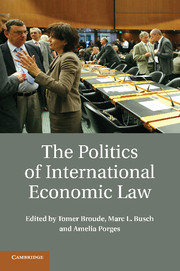Book contents
- Frontmatter
- Contents
- Contributor List
- Acknowledgments
- 1 Introduction
- Part I The Politics of Law Making in International Trade
- Part II The Politics of International Investment Treaty Making
- 6 The Politics of the European Union's Investment Treaty Making
- 7 The Politics of China's Investment Treaty-Making Program
- 8 The Politics of South–South Bilateral Investment Treaties
- Part III The Politics of Sovereign Wealth and International Financial Law
- Part IV The Politics of Dispute Settlement in International Economic Law
- Part V Linkages between International Economic Law and Foreign Policy
- Index
7 - The Politics of China's Investment Treaty-Making Program
Published online by Cambridge University Press: 03 May 2011
- Frontmatter
- Contents
- Contributor List
- Acknowledgments
- 1 Introduction
- Part I The Politics of Law Making in International Trade
- Part II The Politics of International Investment Treaty Making
- 6 The Politics of the European Union's Investment Treaty Making
- 7 The Politics of China's Investment Treaty-Making Program
- 8 The Politics of South–South Bilateral Investment Treaties
- Part III The Politics of Sovereign Wealth and International Financial Law
- Part IV The Politics of Dispute Settlement in International Economic Law
- Part V Linkages between International Economic Law and Foreign Policy
- Index
Summary
INTRODUCTION
China's rise as an economic player is causing significant power shifts in the world economy. Its strength as a low-cost manufacturer helps to supply global markets with cheap products and simultaneously increases the global demand for commodities. This growing economic presence – in accordance with the classical argument by Paul Kennedy on The Rise and Fall of the Great Powers – consequentially augments China's political influence in international relations.
A phenomenon demonstrating China's economic rise is its growing outward foreign direct investments (FDIs). They have recently been widely discussed in the literature as part of a larger trend of developing countries' emergence as sources of investments. Less visible in the literature is a second trend, namely Beijing's growing acceptance of international investment agreements as legal instruments for the protection of FDIs. Most notably, China has been negotiating bilateral investment treaties (BITs) since the end of the 1990s that include far-reaching substantive and procedural investment protection. This new policy was a turning away from China's traditional stance toward international investment law that accentuated the host country's sovereign right to regulate foreign investments – a policy typical for FDI-importing countries. Nowadays China is demonstrating new confidence as an actor of importance in the global governance system for FDI, shown by its willingness to engage in BIT negotiations with the United States.
Against this background, this chapter empirically investigates the evolution of China's BIT policy since the early 1980s.
- Type
- Chapter
- Information
- The Politics of International Economic Law , pp. 162 - 185Publisher: Cambridge University PressPrint publication year: 2011
- 13
- Cited by



